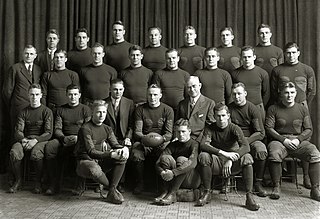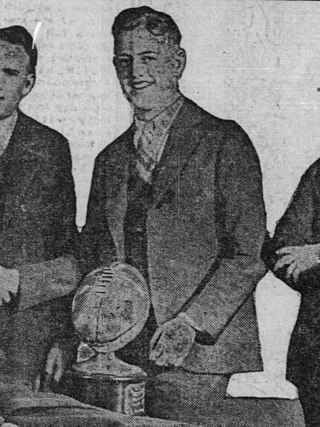Related Research Articles

The Michigan–Ohio State football rivalry, referred to as The Game by some fans and sports commentators, is an American college football rivalry game that is played annually between the Michigan Wolverines and the Ohio State Buckeyes. As of 2023, Michigan and Ohio State have the most and third most wins of any program in NCAA Division I football history, respectively. The rivalry has gathered profound national interest as many of the games determined the Big Ten Conference title and the resulting Rose Bowl Game matchups, as well as the outcome of the NCAA Division I college football championship. In 2000, the game was ranked by ESPN as the greatest North American sports rivalry ever. The rivalry is listed in Rivals!: The Ten Greatest American Sports Rivalries of the 20th Century, published by Wiley. Encyclopædia Britannica includes the rivalry as one of the ten great sports rivalries in history.

The 1933 Michigan Wolverines football team represented the University of Michigan in the 1933 Big Ten Conference football season. Under fifth-year head coach Harry Kipke, Michigan compiled an undefeated 7–0–1 record, outscored opponents 131 to 18, extended the team's unbeaten streak to 22 games, and won both the Big Ten Conference and national football championships. The defense shut out five of its eight opponents and gave up an average of only 2.2 points per game. In December 1933, Michigan was awarded the Knute K. Rockne Trophy as the No. 1 team in the country under the Dickinson System. By winning a share of its fourth consecutive Big Ten football championships, the 1933 Wolverines also tied a record set by Fielding H. Yost's "Point-a-Minute" teams from 1901 to 1904.

The 1903 Michigan Wolverines football team represented the University of Michigan in the 1903 college football season. The team's head football coach was Fielding H. Yost. The Wolverines played their home games at Regents Field. The 1903 team compiled a record of 11–0–1 and outscored opponents 565 to 6. The only points allowed came on a touchdown in a 6–6 tie with Minnesota. All eleven wins were shutouts. The 1903 Michigan team was the third of Yost's "Point-a-Minute" teams and has been recognized retrospectively as a co-national champion by the National Championship Foundation.

The 1980 Michigan Wolverines football team was an American football team that represented the University of Michigan in the 1980 Big Ten Conference football season. In their 12th season under head coach Bo Schembechler, the Wolverines compiled a 10–2 record, won the Big Ten Conference championship, defeated Washington in the 1981 Rose Bowl, and outscored all opponents by a total of 322 to 129. The Rose Bowl victory was Schembechler's first in a bowl game, following seven bowl games losses. After falling out of the rankings for four weeks, the 1980 Wolverines ended up being ranked No. 4 in both the AP and UPI polls.

The 1985 Michigan Wolverines football team represented the University of Michigan in the 1985 Big Ten Conference football season. In their 17th year under head coach was Bo Schembechler, the Wolverines compiled a 10–1–1 record, outscored all opponents by a combined total of 342 to 98, defeated five ranked opponents, suffered its sole loss against Iowa in a game matching the #1 and #2 teams in the AP Poll, defeated Nebraska in the 1986 Fiesta Bowl, and were ranked #2 in the final AP and Coaches Polls.

The 1897 Michigan Wolverines football team was an American football team that represented the University of Michigan in the 1897 Western Conference football season. In its first season under head coach Gustave Ferbert, the team compiled a 6–1–1 record, finished third in the Western Conference, and outscored opponents by a total of 166 to 31.

The 1960 Michigan Wolverines football team was an American football team that represented the University of Michigan in the 1960 Big Ten Conference football season. In its second year under head coach Bump Elliott, Michigan compiled a 5–4 record, finished in fifth place in the Big Ten, and outscored opponents by a combined total of 133 to 84.
The 1937 Michigan Wolverines football team was an American football team that represented the University of Michigan in the 1937 Big Ten Conference football season. In their ninth season under head coach Harry Kipke, the Wolverines compiled a 4–4 record and tied for fourth place in the Big Ten. Kipke was fired after the season, having compiled a 46–26–4 record in nine years as Michigan's head coach.
The 1934 Michigan Wolverines football team was an American football team that represented the University of Michigan in the 1934 Big Ten Conference football season. In their sixth season under head coach Harry Kipke, the Wolverines compiled a 1–7 record and finished last in the Big Ten. Prior to the 1934 season, the Wolverines had compiled a 22-game undefeated streak dating back to October 1931.

The 1929 Michigan Wolverines football team was an American football team that represented the University of Michigan in the 1929 Big Ten Conference football season. The team compiled a 5–3–1 record, tied for seventh place in the Big Ten, and outscored its opponents by a total of 109 to 75. In late May 1929, Tad Wieman was removed as the team's head coach. Harry Kipke was hired as his replacement in mid-June; Kipke remained as Michigan's head football coach for nine seasons.

The 1928 Michigan Wolverines football team was an American football team that represented the University of Michigan in the 1928 Big Ten Conference football season. The Wolverines compiled a 3–4–1 record, tied for seventh place in the Big Ten, and were outscored by their opponents by a total of 62 to 36.

George E. "Gooch" Gauthier was an American football and basketball player, athletic coach, and college athletics administrator. He served as the head football coach at Michigan Agricultural College, now Michigan State University, in 1918 and at Ohio Wesleyan University from 1921 to 1946, compiling a career record of 125–101–15. Gauthier was also the head basketball coach at Michigan Agricultural from 1916 to 1920 and at Ohio Wesleyan for the 1945–1946 season, tallying a career mark of 47–46.

The History of Michigan Wolverines football in the Yost era covers the period from the hiring of Fielding H. Yost as head coach in 1901 through Yost's firing of Tad Wieman as head coach after the 1928 season. The era includes the brief head coaching tenures of George Little and Tad Wieman. Wieman was head coach during the 1927 and 1928 seasons but contended that he had never truly been allowed to take control of the team with Yost remaining as an assistant coach and athletic director.

The promotion of Bump Elliott to head coach in 1959 defined a historical era of the University of Michigan Wolverines football through 1968 when he resigned after that season. Michigan was a member of the Big Ten Conference and played its home games at Michigan Stadium during the Elliott years. During the 10 years in which Elliott served as head football coach, Michigan compiled a record of 51–42–2 (.547) and claimed one Big Ten championship, one Rose Bowl victory, and two Chicago Tribune Silver Football awards for the most valuable player in the Big Ten. However, the Wolverines finished higher than third place in the Big Ten only twice.
The 1964 Big Ten Conference football season was the 69th season of college football played by the member schools of the Big Ten Conference and was a part of the 1964 NCAA University Division football season.
The 1948 Big Nine Conference football season was the 53rd season of college football played by the member schools of the Big Nine Conference and was a part of the 1948 college football season.

The 1918 Big Ten Conference football season was the 23rd season of college football played by the member schools of the Big Ten Conference and was a part of the 1918 college football season.

The 1925 Big Ten Conference football season was the 30th season of college football played by the member schools of the Big Ten Conference and was a part of the 1925 college football season. Over the course of the season, Big Ten teams played 36 non-conference games, compiling a 27–9 record (.750) in those games.
The 1921 Big Ten Conference football season was the 26th season of college football played by the member schools of the Big Ten Conference and was a part of the 1921 college football season.
The 1971 Big Ten Conference football season was the 76th season of college football played by the member schools of the Big Ten Conference and was a part of the 1971 NCAA University Division football season.
References
- ↑ "Sing the Songs of Cornell". Chicago Daily Tribune . February 2, 1896. p. 3 – via Newspapers.com.
- ↑ "Chicago Cubs Win the Championship in Easy Fashion". St. Louis Post-Dispatch . October 13, 1907. p. 11 – via Newspapers.com.
- ↑ "Minnesota Eleven Favored to Beat Wolverines at Ann Arbor". Minnesota Daily Star . November 24, 1923. p. 10 – via Newspapers.com.
- ↑ "Gophers O.K.: Doc Didn't Say Anything". The Minneapolis Morning Tribune . November 17, 1925. p. 2 – via Newspapers.com.
- ↑ "The Green Inauguration". Lansing State Journal . December 4, 1926. p. 4 – via Newspapers.com.
- ↑ W. W. Edgar (October 7, 1928). "Ohio Wesleyan Surprises Michigan and Wins Opener, 17 to 7: Battling Bishops Outplay Yostmen Throughout Game". Detroit Free Press . pp. 18, 22 – via Newspapers.com.
- ↑ "It's Singing Bishops Now". The Mansfield News . October 9, 1928. p. 14 – via Newspapers.com.
- ↑ Emmanuel, Greg (2010). The 100-Yard War: Inside the 100-Year-Old Michigan-Ohio State Football Rivalry. John Wiley & Sons. p. 44. ISBN 978-1118040232.
- ↑ Gitlin, Martin (2014). The Greatest College Football Rivalries of All Time: The Civil War, the Iron Bowl, and Other Memorable Matchups. Rowman & Littlefield. pp. 5–6. ISBN 978-1442229846.
- ↑ Harley, Bob (October 17, 1933). "Ohio State-Michigan Contest Holds Interest of Grid World". Akron Beacon Journal . Retrieved April 25, 2018– via Newspapers.com.
- 1 2 Meisel, Zack (2015). The Ohio State Buckeyes Fans' Bucket List. Triumph Books. p. 98. ISBN 978-1633193840.
- ↑ "17 Ohio State traditions that (probably) won't get anyone fired ... and the stories behind them". Columbus Dispatch . August 27, 2014. Retrieved April 25, 2018.
- ↑ Thurber, James (1941). The Male Animal: A Comedy in Three Acts. Samuel French, Inc.
- ↑ Kline, Benjamin (November 21, 1997). "Wolverines Show Teeth Before Game". Dayton Daily News . Retrieved April 25, 2018.